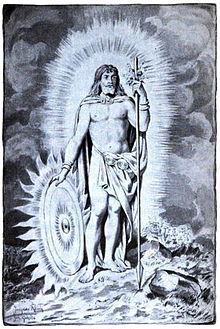 Baldr is a Norse god associated with light, beauty, love, and happiness. | |
| Gender | male |
|---|---|
| Language(s) | Old Norse |
| Origin | |
| Meaning | "prince" |
| Other names | |
| See also | Balder, Baldr |
Baldur is a Norse and Icelandic name, meaning "prince." Baldr is also a god in Norse mythology, associated with light, beauty, love and happiness. [1]